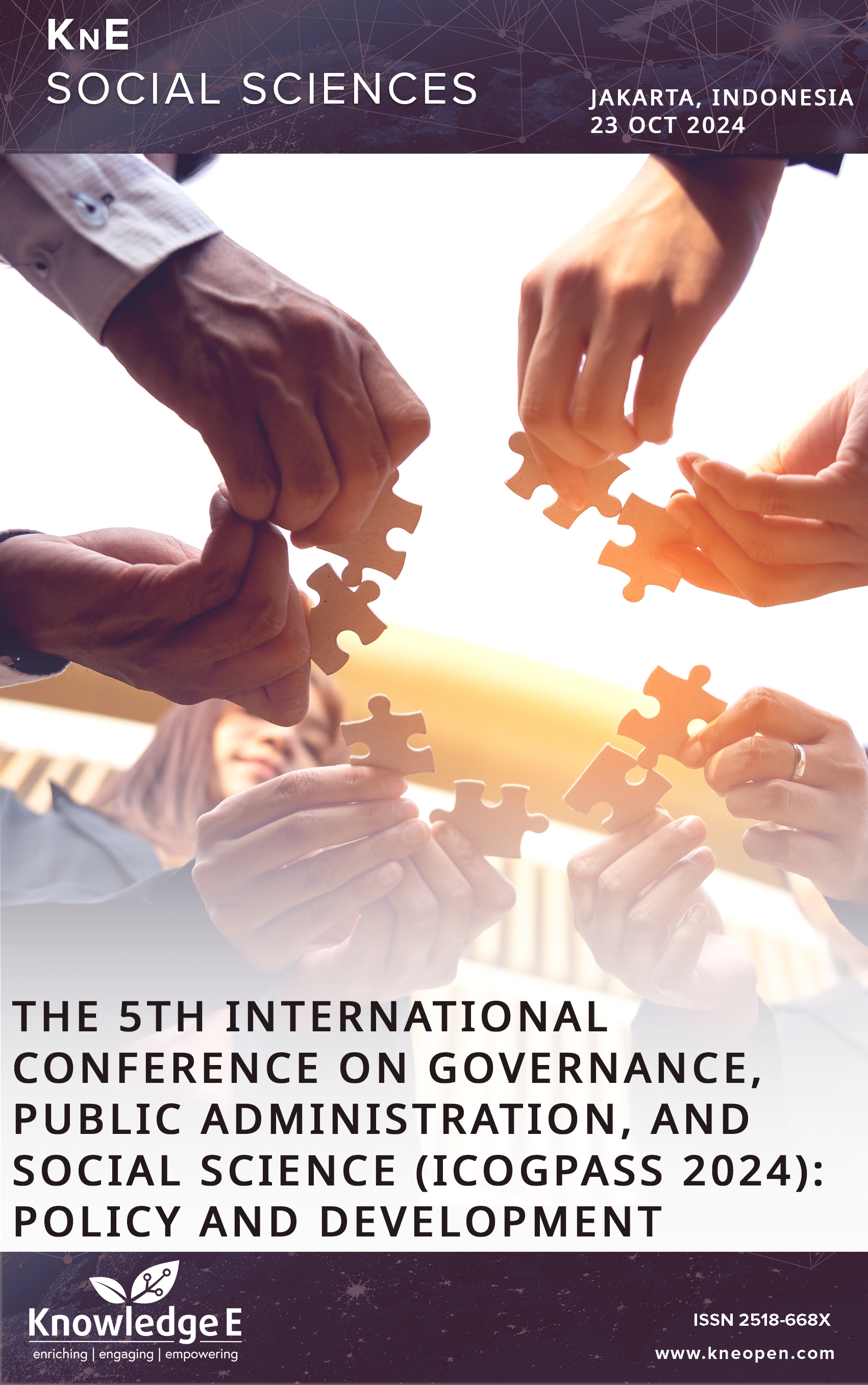Gender Equality-based Tourism Development in Indonesia: Case Study in Denpasar City, Bali Province
DOI:
https://doi.org/10.18502/kss.v10i15.19174Keywords:
tourism, development, equality, genderAbstract
Women’s empowerment is a strategic way to increase women’s potential and their role in both public and domestic domains, carried out to achieve a better quality of life and equality between men and women. A problem faced in tourism development in the city of Denpasar, Bali is the limited roles available for women from a socio-cultural aspect. This research aims to analyze tourism development based on gender equality in Denpasar City and the obstacles it faces. It uses a qualitative descriptive approach, collecting data through documents, interviews, and observations, and determining informants using the snowball technique. Results indicate that tourism development in Denpasar City does not show maximum gender equality. While from the awareness dimension it shows women’s involvement, but looking at women’s capacity, power in decision making, and supervision, it is less than optimal due to social and cultural obstacles. Furthermore, equality has been maximized at the transformation of action aspect thanks to support from the government. One of the obstacles faced are the parts of customary law which indicate that decision-making it is the arena of men. We recommend the continual socializing of gender equality in the tourism sector, holding leadership and skills trainings for skills specifically for women in the tourism sector, and increasing campaigns on gender equality in the tourism sector.
References
[1] El-Haggar S, Samaha A. Sustainable Touristic Community BT - Roadmap for Global Sustainability — Rise of the Green Communities. In: El-Haggar S, Samaha A, editors. Advances in Science, Technology & Innovation [Internet]Cham: Springer International Publishing; 2019. pp. 121–35.
[2] Ilieva L, Petrova M, Todorova L. Application of technological innovations in the tourism industry. E3S Web Conf. 2023;408:1–13.
[3] Zainullina T, Kedrova I. Multiplicative effect as a factor in the development of industrial tourism in the Rostov Region. E3S Web Conf. 2023;381.
[4] Nguyen CP. Tourism and gender (in)equality: global evidence [Internet]. Tour Manag Perspect. 2022;41:100933. Available from: https://www.sciencedirect.com/science/ article/pii/S221197362100146X
[5] Pécot M, Ricaurte-Quijano C, Khoo C, Vázquez MA, Barahona-Canales D, Ling Yang EC, et al. From empowering women to being empowered by women: A gendered social innovation framework for tourism-led development initiatives. Tour Manage. 2024;102( January):104883.
[6] Wen JJ, Lin Q, Wangzhou K. Living with Colours and Pride: Tourism, Ethnicity, and Gender in Yunnan, China. Tour Hosp. 2022;3(4):870–9.
[7] Ling Yang EC, Kimbu AN, Cai W, Swart MP. ARE BREAKING THE GLASS CEILING, BUT CAN WE SHATTER THE CONCRETE ROOF: What Is Next for Gender Studies in Tourism? In: ROUTLEDGE HANDBOOK ON GENDER IN TOURISM: Views on Teaching, Research and Praxis [Internet]. Taylor and Francis; 2024. p. 291–302. Available from: https://www.scopus.com/inward/record.uri?eid= 2-s2.0-85186794966&doi=10.4324%2F9781003286721-26&partnerID=40&md5= 50a63ae6c9306cbd0c5261304bcb31d8
[8] Singh A, Anantharajah S, Francis RS. Women’s empowerment and tourism development: An Indian perspective. Women’s Empowerment Within the Tourism Industry [Internet]IGI Global; 2023. pp. 20–31., Available from https://www.scopus. com/inward/record.uri?eid=2-s2.0-85169526342&doi=10.4018%2F978-1-6684- 8417-3.ch002&partnerID=40&md5=bdefda8460cb160e943099946b3462f4
[9] Vithayaporn S. The Influence of Cultural Differences on Gender Issues in Tourism and Hospitality Employment: A Grounded Theory Analysis. Asian J Bus Res [Internet]. 2023;13(2):86–106. Available from: https://www.scopus.com/inward/record. uri?eid=2-s2.0-85168095163&doi=10.14707%2Fajbr.230151&partnerID=40&md5= 937aaec1bd59c2ce58d30d53099000c5https://doi.org/10.14707/ajbr.230151.
[10] LaPan C, Morais DB, Wallace T, Barbieri C, Floyd MF. Gender, work, and tourism in the Guatemalan Highlands [Internet]. J Sustain Tour. 2022;30(12):2839– 59. Available from: https://www.scopus.com/inward/record.uri?eid=2-s2.0- 85111153274&doi=10.1080%2F09669582.2021.1952418&partnerID=40&md5= fb2738351f12a2938b4fcd56591a150e
[11] Maria B. Murdana Made I KR. Strategy for Development of Pink Beach as a Tourism Attraction in Labuan Bajo. West Manggarai Regency. 2022;1(3):281–90.
[12] Setiawan IB. IDENTIFICATION OF TOURISM POTENTIAL AND THE 4As (ATTRACTION, AMENITY, ACCESSIBILITY, ANCILLIARY) IN SUMBER WANGI DUSUN, PEMUTERAN VILLAGE, GEROKGAK DISTRICT, BULELENG DISTRICT, BALI [Internet]. UDAYANA UNIVERSITY; 2015. Available from: https://repositori.unud.ac.id/protected/storage/upload/penelitianSimdos/ f3e2c92782684ae4ee371072d490ae74.pdf
[13] Kusworo. Government Functions Acceleration in Tourist Village Development: a Case Study of Dermaji Village. Int J Prof Bus Rev. 2023;8(3):1–18.
[14] Ananya SA, Al Muneem A, Hassan A. Tourism Policy Analysis of Required Tourist Facilities in Bangladesh. In: Tourism Policy and Planning in Bangladesh [Internet]. 2020. p. 53–69. Available from: https://www.scopus.com/inward/record.uri?eid= 2-s2.0-85151675885&doi=10.1007%2F978-981-15-7014-8_4&partnerID=40&md5= bc1df1acf33197aa382f7f4fe897ed26https://doi.org/10.1007/978-981-15-7014-8_4.
[15] Srivastava A, Pathania A, Kumari G. Women and tourism: A study on gender equality, social inclusion, and empowerment. Interlinking SDGs and the Bottom-of-the-Pyramid Through Tourism [Internet]IGI Global; 2024. pp. 96–115., Available from https://www.scopus.com/inward/record.uri?eid= 2-s2.0-85203209329&doi=10.4018%2F979-8-3693-3166-8.ch005&partnerID= 40&md5=5f2aca7e498c63f52f026a9dff05460d
Published
How to Cite
Issue
Section
License
Copyright (c) 2025 Tri Yuniningsih, Endang Larasati Setianingsih, Sri Suwitri, Sunee Hongwiset

This work is licensed under a Creative Commons Attribution 4.0 International License.

